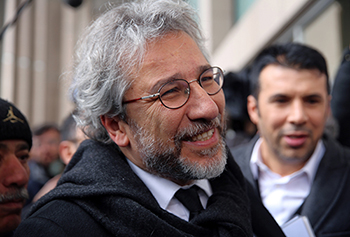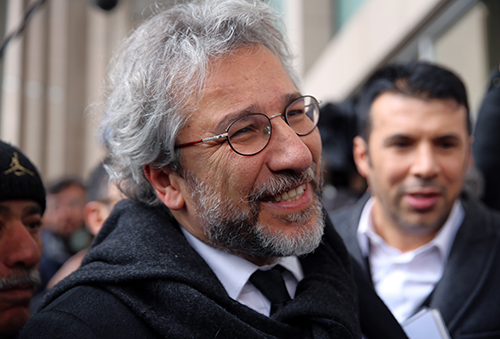Note to our readers: CPJ plans to intensify our documentation of press freedom violations in the United States, following the election on November 8, 2016, of Donald Trump as president. During his campaign, Trump verbally attacked journalists, restricted access, threatened lawsuits, and promised to make legal action against the media easier under his administration.
We will have more details in next month’s edition.
CPJ’s 2016 press freedom awardee sought by police during raid
Police in Istanbul in late October raided the offices of the daily newspaper Cumhuriyet and detained at least 12 of the paper’s journalists and directors, accusing them of “producing propaganda” for the Kurdistan Workers’ Party, or PKK. Police also produced a court order making the investigation secret, which means that the journalists’ lawyers will not know anything about the investigation until indictments are issued.
During the raid, police searched for other journalists, some of whom were out of the country. Can Dündar, former editor-in-chief of Cumhuriyet, was one of them.

Dündar, who resigned his position with Cumhuriyet in August and left Turkey, has said that he will not return until the Turkish government lifts the state of emergency imposed following the failed attempted coup in July. Last month, CPJ joined with 25 international press freedom and human rights groups to call on Turkey to lift the state of emergency, saying that “Turkish authorities have abused emergency provisions to stifle dissent, through the detention of large numbers of individuals, including both real and perceived critics of the government and others.”
Dündar is one of four journalists CPJ is honoring at its 2016 International Press Freedom Awards. The other awardees are Mahmoud Abou Zeid, an Egyptian freelance photojournalist also known as Shawkan, who has been jailed since August 2013; Malini Subramaniam, an Indian freelance journalist who fled her home state this year after being harassed and threatened; and Óscar Martínez, an investigative reporter for a Salvadoran online newsmagazine, who has been threatened for his work.
“These four brave journalists have risked their freedom–and their lives–to report to their societies and the global community about critical news events,” said CPJ Executive Director Joel Simon.
CPJ is also honoring Christiane Amanpour, chief international correspondent and anchor at CNN, with the Burton Benjamin Memorial Award for extraordinary and sustained achievement in the cause of press freedom. The 2016 awardees will be honored at CPJ’s annual benefit dinner at the Waldorf-Astoria in New York City on November 22. This year’s chairman is Jeff Zucker, president of CNN Worldwide. For more information on reserving a table at the benefit dinner, please click here. To purchase tickets to the dinner, please call CPJ’s development office at (212) 300-9021.
CPJ issues annual Impunity Index
CPJ has released its global Impunity Index to mark the International Day to End Impunity for Crimes against Journalists on November 2. The index, which was translated into five languages, spotlights countries where journalists are slain and their killers go free.
The 2016 Impunity Index found that some of the highest rates of impunity in journalist murders can be attributed to killings by Islamist militant groups. The worst country for the second year in a row is Somalia, where the militant group al-Shabaab is suspected in the majority of journalist killings. Next are Iraq and Syria, where members of the militant group Islamic State murdered at least six journalists in the past year.
Our research shows that political groups, including Islamic State and other extremist organizations, are the suspected perpetrators in more than 40 percent of murder cases over the past decade. Government and military officials are considered the leading suspects in nearly a quarter of the cases in the same period.
“This is one of the most important things that CPJ does–advocate for justice in journalist murders,” said Courtney Radsch, CPJ’s advocacy director. “For every 10 journalists who are murdered, nine of the cases are unresolved, so we certainly have a lot of work left to do.”
Our years-long advocacy paid off with convictions in the murders of at least six journalists in 2015 and eight journalists in 2016. In March 2016, a court sentenced a man to life in prison in connection with the murder of Ayub Khattak, a Pakistani reporter who was shot dead outside his home in 2013. A Brazilian court in August 2015 sentenced an individual to 16 years in prison for carrying out the 2013 murder of radio journalist Rodrigo Neto.
U.S. court rejects rioting charge against journalist
A U.S. court in mid-October refused to authorize a charge of rioting against Amy Goodman, an award-winning journalist for the independent public TV and radio news program “Democracy Now!,” in connection with her coverage of an attack on protesters in the state of North Dakota
The charges stemmed from “Democracy Now!’s” coverage of protesters being attacked by security guards. The report showed security guards using dogs and pepper spray to disperse protesters in September.
“The fact that these charges were even filed against a journalist in the first place is simply ludicrous,” said Carlos Lauría, CPJ’s program director and senior program coordinator for the Americas. “Amy Goodman was simply doing her job–and doing it well.”
Goodman was initially charged with criminal trespassing. But when she arrived in North Dakota to challenge the trespassing charge, she learned that it had been dropped and that a new charge of rioting had been filed against her. “I wasn’t trespassing. I wasn’t rioting. I was simply doing my job as a reporter. I think the state’s attorney is sending out a message that reporters should not come to the state of North Dakota,” Goodman told CPJ.
For more coverage of press freedom in the U.S., please visit CPJ’s Americas page.
Pakistan lifts travel ban on journalist
About a week after CPJ published an alert calling on Pakistan to lift the travel ban on Cyril Almeida, a columnist at the independent daily Dawn, authorities did so.
On October 11, CPJ reported on the case of Almeida, who was notified the previous day that he had been placed on Pakistan’s “exit control list” after he published an article in Dawn describing a clash between the civilian government of Prime Minister Nawaz Sharif and the military. The ban came a day before Almeida was due to leave for a vacation with his family in Dubai.
Almeida’s report described a confrontation in which civilian leaders warned the military that Pakistan faced international isolation unless the military cracked down on Islamist groups. According to the article, Sharif’s younger brother, Shahbaz Sharif, the chief minister of Punjab province, accused the military of working to free militants who had been arrested by civilian authorities. Dawn published government denials of the story, but maintains the accuracy of its reporting.
On October 17, Pakistan’s Ministry of Interior issued an official memorandum saying that it had decided to delete Almeida’s name from the list. The memo did not provide a reason for the decision.
“We’re very pleased that the Pakistani government lifted the travel ban against Cyril Almeida,” said CPJ Asia Program Coordinator Steven Butler. “Pakistan has a large and vibrant press community, one that should not be stifled by government harassment like this.”
CPJ in the news
A key task for grantmakers: Enhance the freedom of journalists around the world
13 countries where journalists have been killed with impunity
Regent to stand in as grieving Thailand awaits new king
Libya: ISIS sniper shoots dead Dutch journalist
CPJ seeks immediate revocation of ban on Kashmir Reader
American journalist detained in Turkey for two months is freed
Join us in defending brave journalists worldwide!
